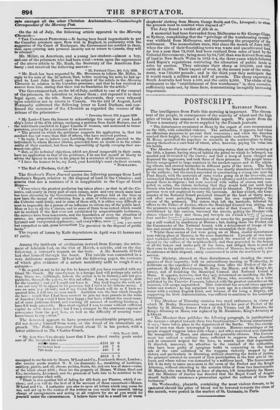Among the incidents of civilization derived from Europe, the settle-
ment of Adelaide had, on the 31st of March, a suicide, and on the day following, a coroner's inquest on the body. A Mr. Kenneth aPIver had shot himself through the heart. The suicide was committed in a very deliberate manner : Mgver left the following paper, the contents of which give evidence of a nature manifestly unfit to rough it as a colonist— "Be so good as not to let my fate be known till you have consulted with my friend Mr. Gooch. My countrymen in a foreign land will perhaps pity rather than blame me, (although, indeed, the action is to be blamed,) and not give publicity, through the papers, to this sad affair. I am, in every respect, unfit for the country-; and yet I could not leave it. May God ffirgive the rash act. I am not very fit to appear in his presence, but I trust in his infinite mercy. I owe no man eliy ill-will ; and if my friend Mr. Gooch will do as I have re- quested him, 1 will owe no man much. Ambition was the lure which brought me here : would that I had been content to join my dear parents in the wilds of America then would I have been happy; but here, without the sweet coun- sel of sonic judicious friend, and wanting all manner of soothing kindness, I have felt truly miserable. How short-sighted I was, to come without sufficient capital to settle down here but I was a stranger to time enormous expense of conveyance from the port here, as well as the difficulty of securing ware- house-room to any extent."
The deceased appears to have possessed considerable property, and did not &sm.:: himself from want, or the dread of its immediate ap- proach. The Police Inspector found about 71. in his pocket, with a letter addressed to Mr. Charles Gooch.
30th March 1839.
" My dear Sir—You already know that I have placed sundry goods under care of Mr. Alorphett for sale-
-10,11SO slates £181 10 0
,‘,1) tierces beer 196 7 6
793 deals 240 7 9 £618 5 3
consigned to me for sale by Messrs. M'Leod and Co., Fenchurch Street, London ; also sundry goods marked W. S. (in diamond) L., consisting of hardware, saddlery, paints, and oil, cheese, pickles, fruits, 8sc. and one box of shoes—value of the whole about 2101.; these are the property of Messrs. William Steel and Co., merchants, Liverpool, and the proceeds of both lots to he remitted to the respective parties when sold. " There is also another bill of lading for 432 deals per Planter, which I en- close; and you will do the best of it for account of those concerned—Messrs. M'Lcod and Co. I authorize you also to open all letters which may come for me, and act up to the wishes of the writers as you would for yourself, taking charge of consignments and acting in all respects for me as you would for yourself under the circumstances. I believe there will be a small lot of warm shepherds' clothing from Messrs. George Smith and Co., Liverpool; to whom the proceeds must be remitted when disposed of."
The Jury found a verdict of felo de se.
A memorial had been forwarded from Melbourne to Sir George Gipps, at Sydney, complaining that the "privilege of the warehousing system" was withheld from Melbourne, and representing the prosperity of the settlement. The memorialists state, that since the month of June 1837, when the site of their flourishing town was waste and uncultivated land, no less a sum than 72,0001. had been realized from sales of land by the Colonial Government ; being more by 24,7581. than was derived from sales of land in New South Wales in 1832-3-4, the three years which followed Lord Ripon's regulations restricting the alienation of public lands to sales by auction. They calculate their sheep at 500,000, and their cattle at 15,000. Their export of wool, in the second year of the settle. silent, was 750,000 pounds ; and in the third year they anticipate that it would reach a million and a half of pounds. The sheep exported to South Australia had been 4,500, and the cattle 2,500. The claim of the settlement to the "establishment of free warehouses" is, they conceive, sufficiently made out, by these facts, demonstrating its rapidly increasing importance.


























 Previous page
Previous page